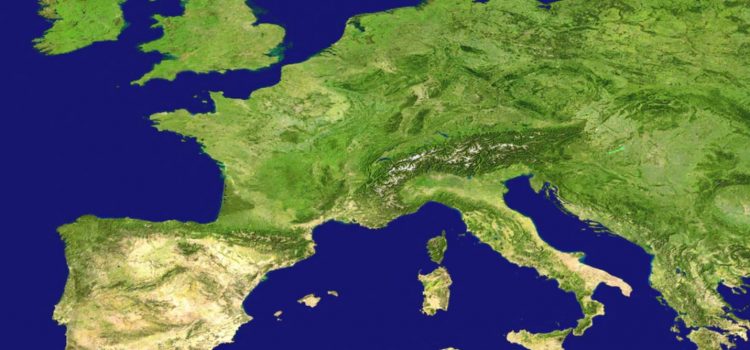

This article is an excerpt from the Shortform book guide to "Imagined Communities" by Benedict Anderson. Shortform has the world's best summaries and analyses of books you should be reading.
Like this article? Sign up for a free trial here .
How did nationalism arise in Europe? What were the key factors that have led to its development?
It wasn’t until the nineteenth century that Europe started to feel its own form of national pride—part of this was thanks to the Enlightenment. Another contributing factor was the realization that Latin wasn’t the “superior” language and that there were, in fact, many ancient languages in the world.
Keep reading to learn more about the making of nationalism in Europe.
Modern European Nationalism
According to Benedict Anderson, the author of Imagined Communities, the making of nationalism in Europe in its modern form didn’t come to the fore until the late 18th and early 19th centuries, as Europeans rediscovered and promoted cultural artifacts from their own past—with a particular focus on history, literature, folklore, mythology, and music. Nineteenth-century Europeans, at last, began to see their own culture and history as being on par with—and even superior to—that of the Greeks and Romans.
In each country, the promoters of these emerging national identities—typically drawn from the ranks of the educated middle and professional classes—pored over ancient texts, folklore, and literature in an effort to reach back into history and find historical evidence of their “nationhood” in the distant past.
| National Origin Myths in Germany These national origin stories were important elements in the cultivation of a shared national identity—although they often had political effects far beyond what anyone at the time could have imagined. In the case of Germany, these nation-making myths proved to be an important element in the development of Nazi ideology in the 20th century. Nineteenth-century promoters of German nationalism were beginning to rediscover what they saw as their national origins and celebrate a uniquely Germanic past entirely separate from Europe’s Roman/Latin past. This was the age in which famous figures like the composer Richard Wagner reached deep into the mythological past to incorporate elements of Germanic and Norse mythology into their artistic works. These nationalists often pointed to the famous victory of the Germanic leader Arminius over three Roman legions at the Teutoburg Forest in AD 9 as the moment when the German nation came into being. Of course, the forces commanded by Arminius at this battle were drawn from a patchwork of over 50 tribes that had no shared “German” identity at all and quickly dissipated after their victory. Indeed, there would be no united German nation until Otto von Bismarck’s unification of the German states nearly two thousand years later in 1871 following the Franco-Prussian War. But the myth of Arminius and the victory at the Teutoburg Forest proved valuable fodder to German nationalist propaganda. This was eventually taken up by the Nazis, who saw Arminius as the national race hero of the German people who had defended the homeland against foreign threats. Arminius’s associations with Nazi race ideology have made once-traditional German celebrations of the battle at Teutoburg Forest politically contentious today. |
Discovering the Non-European Ancient Past
The Enlightenment and its spirit of scientific inquiry also kicked off a new era of European interest in the ancient civilizations of the non-European world.
Anderson notes that the new European thirst for knowledge about ancient Asian and African societies—usually closely connected to colonial and imperialist ambitions—helped to deliver the final blow to Latin’s status as the ancient bond that held European societies together.
When European intellectuals began discovering and studying the ancient languages of Assyria and Egypt, they found that these languages were much older than Latin. Before this, Europeans exalted Latin as the venerable language that linked them to their glorious ancient Roman past, as well as the lingua franca of the Church—a crucial bond that held together the imagined community of Christendom.
But with the explosion of knowledge about the languages and history of the non-European world, European intellectuals saw that Latin was merely one among many ancient languages. Other languages and civilizations had predated it, and in some respects, their cultural achievements dwarfed those of Classical Europe.
Anderson argues that this downgrading of the Latin tradition (which, as we’ve seen, was already underway since the beginning of vernacular book-printing in the 15th century) enabled Europeans to finally fully break free from the intellectual stranglehold of their ancient past and created space for them to begin to define their own national and linguistic identities.
| Philology and Language as Destiny In Orientalism, Edward Said points to the rising prominence of the field of philology in European intellectual circles at this time as another development that helped to define Europeans’ views of their own civilization vis-à-vis the rest of the world. Philology is the study of language, primarily using written, ancient textual sources, aiming to understand the evolution of languages from a scientific perspective. For the philologists, language was the key to understanding Eastern (or “Oriental”) culture, history, and the “Oriental mind.” Philologist scholarship contributed heavily to the racial determinism that would become a hallmark of the social sciences during the 19th century. Orientalist philologists like France’s Ernest Renan (1823-1892) believed they could discover the reasons for what they saw as “shortcomings” in contemporary Eastern civilization and culture in the structure of their ancient languages. Renan and his colleagues saw the supposedly ossified and static Semitic languages (like Hebrew, Arabic, and Aramaic) as responsible for the languid and desultory development of the Middle East. He contrasted it with the dynamic and organic Indo-European languages to which could be attributed the success of white European civilization—and its inevitable conquest of the East. For the philologists, language was destiny. |

———End of Preview———
Like what you just read? Read the rest of the world's best book summary and analysis of Benedict Anderson's "Imagined Communities" at Shortform .
Here's what you'll find in our full Imagined Communities summary :
- An exploration of the phenomenon of nationalism throughout history
- Why the idea of "the nation" is purely a political innovation
- How the rise in literacy and the printing of books fueled nationalism






